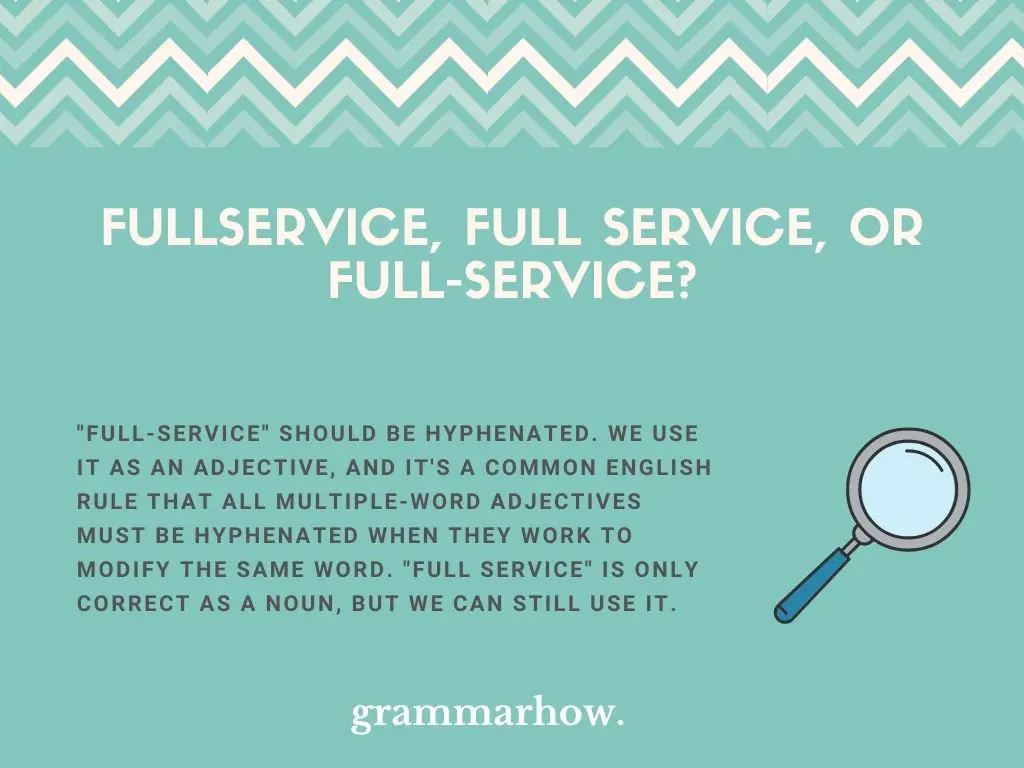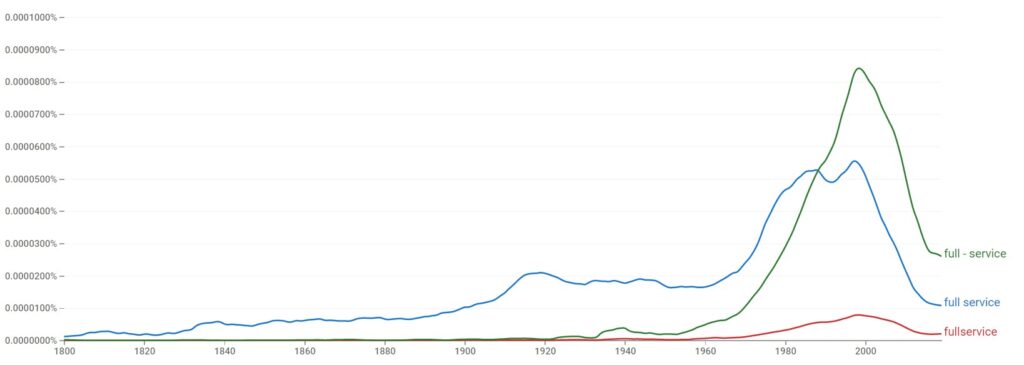It would help to know whether “full-service” is hyphenated or whether you’re supposed to write it as one or two words. Don’t worry; if you’re a bit stumped about it, then this article is all you’re going to need to figure it out!
Full service vs. Full-service vs. Fullservice
“Full-service” should be hyphenated. We use it as an adjective, and it’s a common English rule that all multiple-word adjectives must be hyphenated when they work to modify the same word. “Full service” is only correct as a noun, but we can still use it.

According to Google Ngram Viewer, “full-service” is the most popular choice. This proves that the adjective form is the most common one you’ll come across in English. However, there are a few cases where “full service” is also used on this graph.

In The Cambridge Dictionary and the Oxford Dictionary, “full-service” is the recognized spelling variation. We use it with a hyphen because it is an adjective, and there is almost always a noun to modify after it.
Neither dictionary mentions the other two spelling variations, so we don’t use them as the adjective form. However, it’s still wise to remember that the two-word option is correct when writing it as a noun.
If you’re confused about the differences, you can refer to these examples:
- Adjective: The full-service restaurant has everything included!
- Noun: They are doing a full service on my car.
Is “Fullservice” One Word?
We haven’t mentioned “fullservice” as a one-word spelling yet. That’s because it is grammatically incorrect, and there are no cases where we can make it work. You should avoid using this spelling in both the adjective and noun forms and stick to one of the others.
To help you remember that it’s wrong, you can check out the following:
- Correct: The full-service bank is opened almost all day, so you have enough time to get it sorted.
- Incorrect: I don’t think I need to go to the fullservice station right now.
- Correct: I would like to receive a full service. Do you have that option available?
- Incorrect: They did not provide me with a fullservice, so I complained.
Is “Full service” Two Words?
“Full service” is only written as two words when it’s a phrasal noun. It’s not entirely common to come across in English (at least not compared to the adjective form). However, it is still correct, and you should make sure to use it when there isn’t a modified noun elsewhere.
It won’t make sense to use “full service” if you’re writing it as an adjective. We must always group multiple words with a hyphen when they are used as an adjective. Therefore, the two-word spelling would not fit the English rules of this form.
Here are a few examples to help you understand it:
- I would like full service. Do you offer that?
- We need full service right now.
- You say you provide full service, but I have yet to see that happen.
- Whatever full service implies, I would like to take that!
Is “Full-service” Hyphenated?
“Full-service” is hyphenated in most cases. When we hyphenate it, we write it as an adjective because it uses more than one word to modify the same noun. This is a common English rule that we must stick to whenever we are writing adjectives.
According to AP Stylebook guidelines, you should always hyphenate multiple words when they modify the same noun. This helps readers to understand that they are linked and share meaning.
Here’s how it works:
- The full-service guarantee is something that I’ve always strived to achieve here.
- You should go to the full-service bank for that.
- The full-service station is finally out of gas.
- Where is the full-service place? I need to go there!
Is “Service” Capitalized In The Word “Full-Service”?
Typically, you do not capitalize “full-service” because it’s not a proper noun. Therefore, you do not have to worry about capitalizing the second half of the word.
However, if you choose to write it in a title, you might find it useful to capitalize both parts. After all, if every other word in your title is capitalized, it might look out of place if both parts of “full-service” are not.

Martin holds a Master’s degree in Finance and International Business. He has six years of experience in professional communication with clients, executives, and colleagues. Furthermore, he has teaching experience from Aarhus University. Martin has been featured as an expert in communication and teaching on Forbes and Shopify. Read more about Martin here.

